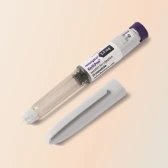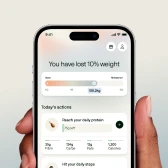With the society we live in and the ease of fast foods, it is no wonder that many people are overweight or obese. We are so busy with our careers and family that finding the time to lose weight can cause added pressure, which is more likely to make us overeat. Yet we all know and understand the benefits of maintaining a healthy weight, such as lower risk of heart disease, diabetes, and other medical conditions.
Losing weight is a journey and one that requires determination, courage, and strength. It can sometimes seem that however much we try, our weight-loss goals just aren’t getting any closer. Luckily, there are now several prescription weight loss medication choices out there to help us achieve our ideal body weight.
Through regular exercise, diet, and the use of prescription weight loss medication, you can lose that stubborn fat and reach those weight loss goals.
Introduction to prescription weight loss medication
If you are currently trying to lose weight, you are not alone. 52% of adults across the globe are trying to lose weight right now. With this in mind, it’s no wonder that prescription weight loss medication has become a popular method for tackling obesity and helping us to feel more confident in our bodies.
There are many prescription weight loss medications available, all of which can assist with weight loss in different ways. Whether you would prefer a weight loss injectable pen or a weight loss tablet, below we look at each medication in more detail.
You can then discuss with your doctor to determine which would be the right choice for you, depending on your medical history and preference.
Types of prescription weight loss medications
Prescription weight loss medications come in a range of different shapes and sizes. Not all prescription weight loss medications are suitable for every person, which is why there are many different treatment options available. Below we look at each type of prescription weight loss medication in more detail, including the active ingredient and how it works.
Orlistat
Orlistat is a weight loss tablet that contains the active ingredient orlistat. It is an unbranded medication that is commonly found under the brand name Xenical. These are the same medications, just under different names.
Orlistat helps with weight loss as it limits the amount of fat you absorb from your food. It should be taken whenever you eat a meal containing fat and will break down about one-third of the fat from your meal. This fat is excreted in your stools, so it can cause oily or fatty stools.
You will be prescribed up to three tablets a day, as each tablet should be taken with a meal.
Liraglutide
Liraglutide is an injectable weight loss treatment marketed under the brand name Saxenda. Liraglutide works in the same way as a hormone in your body known as glucagon-like peptide-1 (GLP-1). Usually, GLP-1 is released after eating and will send signals to your brain that you are full.
When you take liraglutide, the same action will occur. This makes it easier to reduce your daily calorie intake without feeling hungry and irritable. With time, liraglutide can help you achieve your weight loss goals and limit habitual snacking.
Liraglutide is injected once a day and your dose will be increased over five weeks so that your body can get accustomed to the treatment. This can limit the risk of common side effects like nausea.
Phentermine/Topiramate
Phentermine and topiramate are active ingredients that can be combined for weight loss. Qsymia is a weight loss tablet that contains both phentermine and topiramate and it belongs to a group of medications known as sympathomimetic amines. These medications mimic specific hormones and neurotransmitters in your body, to achieve a desired response.
In the case of phentermine/topiramate, the achieved response is reduced hunger levels and enhanced weight loss. You should take one tablet every morning. The daily dose will increase over time, so your weight loss should not plateau.
Naltrexone/Bupropion
Naltrexone and bupropion are two medications commonly used for other medical conditions but are effective for weight loss when combined. Naltrexone is typically used for managing alcohol and opioid addiction and bupropion is an antidepressant. This combination of medications is known as Contrave and it is a weight-loss tablet.
There is research still being carried out to determine exactly how these medications can promote weight loss, but it is thought that they act on certain parts of the brain that control appetite and hunger. Patients who use Contrave have an increased feeling of fullness and can reduce their food intake.
Contrave is also thought to boost metabolism, which aids in weight loss. You will be prescribed a twice-daily dose: once in the morning and evening. Like most prescription weight loss medications, your dose will be increased gradually to a maximum dose of two tablets, twice a day.
Setmelanotide
Setmelanotide is available under the brand name Imcivree and is an injectable weight-loss treatment. The active ingredient is known as a melanocortin 4 (MC4) receptor agonist. People who have specific genetic mutations may have inadequate activation of the MC4 receptor in their brains, and this has been linked to obesity.
By taking setmelanotide, you can increase the activation of the MC4 receptor. This can lead to reduced hunger levels, increased metabolism, and decreased calorie intake, which all contribute to weight loss.
Setmelanotide should be injected once daily, at the start of each day. It does not need to be taken with a meal.
Benefits of prescription weight loss medication
Prescription weight loss medications can have many benefits, with the most important being a significant help with weight loss. When taking prescription weight loss treatment alongside a healthy, balanced diet, a reduced calorie intake, and regular exercise, patients can lose weight easier and quicker than without medication.
One study found that people who use weight loss medication lost 10% or more of their initial body weight. This is enough to start improving your health and lowering your blood pressure and blood sugar levels.
Prescription weight loss medication is an excellent choice for anybody that has struggled with losing weight in the past and needs a little extra push. Reaching and maintaining a healthy weight can have an impact on your daily life, improving self-esteem, fitness levels, and overall health.
Using weight loss medication can also help when your weight loss begins to plateau, giving your body the extra push that it needs to lose stubborn fat. Many of the weight loss medications listed above will reduce your appetite levels, which is a major benefit if you struggle to reduce your portion sizes and feel hungry when dieting.
When you take away the feelings of hunger associated with being on a diet, it becomes a lot easier to implement a lower daily calorie intake without feeling ‘hangry’. This can make your weight loss journey more comfortable. You may also find that you have gotten used to eating less, so when you stop taking the medication, it is easier to remain at a healthy weight.
Risks and side effects of prescription weight loss medication
Each prescription weight loss medication has different risks and side effects, just like all medications. The benefits and results tend to outweigh the risk of any side effects, but your doctor will check your suitability for a weight loss treatment before they prescribe it.
The most common risk for any prescription weight loss medication is a severe allergic reaction (anaphylaxis). You should not take any weight loss treatment if you are allergic to any of the ingredients contained in the medication. If you notice signs of anaphylaxis, such as difficulty breathing, swelling in the mouth and face, or wheezing, get to a hospital straight away or call emergency services.
As Orlistat breaks down fat and excretes it through your stools, it can cause loose or fatty stools, stomach pains, gas, and frequent bowel movements. To minimize the risk of side effects, a low-fat diet is recommended.
Liraglutide or Saxenda can cause common side effects such as nausea, vomiting, diarrhea, or constipation. These are usually mild and will go away as your body gets used to the treatment and your dose increases. Any injectable weight loss treatment can cause problems at the injection site, such as a rash, irritation, pain, or itching.
Taking liraglutide can increase the risk of pancreatitis (inflammation of the pancreas). This can cause severe stomach pain, nausea, and vomiting. If you notice these symptoms, seek immediate medical advice.
The most common side effects of phentermine/topiramate are constipation, paresthesia (a prickling or burning sensation), dry mouth, and constipation. It can also cause an inability to sweat, increase your body temperature, or a change in mood.
Naltrexone/bupropion may also cause nausea and vomiting, as well as constipation, dizziness, headache, and insomnia. Uncommonly, it can also increase your blood pressure and heart rate. Setmelanotide can cause hyperpigmentation, headache, diarrhea, nausea, and stomach or back pain. In some, it can also cause tiredness, vomiting, and depression.
It is important to remember that not everyone will get side effects, and many of the side effects reported are mild and will subside as you carry on with treatment. You can speak to your doctor if you get side effects, and they can help you with managing them. If a prescription weight loss medication causes too many side effects, you can try another that contains a different active ingredient.
Who should take prescription weight loss medication?
Your doctor may recommend taking prescription weight loss medication if you are an adult and:
- Have a BMI (body mass index) of 30 or more
- Have a BMI of 27 to 30, and have a weight-related medical condition, such as type 2 diabetes or high blood pressure (hypertension)
Some weight loss treatments are available for children and teenagers, but this depends on the medication.
Any prescription weight loss tablet does not replace the need for regular physical activity and a healthy diet. Your doctor will give you a lifestyle program to follow or recommend starting one alongside your treatment.
How long should I take prescription weight loss medication?
How long you should take prescription weight loss medication is different for every person. It depends on whether the medication works for you and whether you get any side effects. For most weight loss treatments, once you reach the full dose, your doctor will want to see a loss of 5% or more of your initial body weight after 12 weeks.
If this is not the case, your doctor may recommend another treatment option or get you to try different lifestyle programs for weight loss. If your chosen weight loss treatment is working, you can usually stay on it for as long as you need to. Your doctor will check in with you regularly to make sure there are no side effects and that you are still losing weight.
You can stop taking your medication once you have reached your desired body weight, but you will usually wean off the medication. This will make it easier to maintain your weight loss as your body gets used to not taking the treatment.
Will insurance cover the cost of prescription weight loss medication?
Some insurance plans will cover prescription weight loss medication that is used to treat obesity. You should read your insurance contract or contact your insurance provider directly to see if your plan will cover these medications.
You may have to pay extra for your insurance to cover weight loss medication, so you should calculate the costs o to see which one would be more affordable.
How to choose the right prescription weight loss medication for you
As there are plenty of prescription weight loss medications to choose from, it can be difficult to know which will achieve the best results for you. There is no one-size-fits-all when it comes to prescription weight loss treatments, and each is beneficial and effective in its own right.
You should discuss this with your doctor and consider things like:
- The side effects of each medication
- Which would work best around your schedule
- Your current medical conditions and medications, as some weight loss medications may not be suitable
- Cost
- Your family’s medical history; some weight loss treatments may not be recommended if you have a family history of certain conditions
- Whether you would prefer taking a tablet or an injectable medication
Prescription weight loss medications for children and teens
Children and teens can use prescription weight loss medications if they need help to lose weight. Orlistat and liraglutide have both been approved for use in children 12 years and over. To be suitable for the medication, children and teens aged 12 to 17 should have a body weight of 132 pounds (60kg) or more and be classed as obese on a centile chart.
Setmelanotide is another approved prescription weight loss treatment for children aged 6 and older who have a genetic disorder that causes or contributes to obesity.
Alternative treatments for overweight and obesity
There are several alternative treatments for overweight and obesity if a prescription weight loss treatment is not suitable for you, or you want to try an alternative treatment first. Another injectable weight loss treatment that will be released sometime in 2023 is Wegovy. This contains the active ingredient semaglutide, which works in the same way as liraglutide to combat weight loss.
Exercise is one treatment for overweight and obesity and should be used alongside any prescription weight loss treatment. The UK’s National Health Service (NHS) recommends that we do a minimum of 150 minutes of moderate-intensity exercise or at least 75 minutes of vigorous exercise each week.
Moderate-intensity exercise should increase your heart rate and breathing and includes activities like:
- Cycling
- Power walking or jogging
- Swimming
Vigorous exercise should rapidly increase your heart rate and breathing and you should not be able to hold a conversation. Activities include:
- Running
- HIIT (high-intensity interval training)
- Competitive sports, such as boxing
Diet is another treatment for overweight and obesity and should also be used alongside prescription weight loss treatment and exercise. As a general rule of thumb, you should look to reduce your calorie intake by 600 calories a day. For women, this means consuming 1,400 calories, and for men, 1,900 calories.
What you eat has a major impact on your weight loss journey, so you should make sure you are eating a healthy and balanced diet consisting mainly of proteins, fruit, and vegetables. Avoiding high-fat, greasy, sugary foods will help with weight loss too.
If prescription weight loss medication does not work, your doctor may recommend weight loss surgery. There are different surgeries available, such as gastric band insertion or liposuction. This may be covered by your health insurance, but most weight loss surgeries are done through a private clinic or hospital.
Clinical trials for prescription medications to treat overweight and obesity
Many clinical trials have been completed or are currently being carried out to prove the effectiveness and safety of prescription medications used to treat overweight and obesity.
This study looked at the effectiveness of liraglutide 3 mg daily for weight management. The results found that patients in the liraglutide group lost a mean of 8.4% of their body weight, whilst the placebo group lost a mean of 2.8% of their body weight. This is a difference of 5.6kg by week 56.
Another study on Orlistat found that it is a well-tolerated and effective weight loss medication for obesity and overweight.
You can find clinical trials currently taking place on different weight loss medications by searching online.
Questions to Ask Your Doctor Before Taking Prescription Weight Loss Medication
If you want to take prescription weight loss medication, you should speak to your doctor first. There are certain questions that you can ask to put your mind at ease and that can help you decide which weight loss medication is right for you, such as:
● What is my BMI?
● Is my weight putting my health in danger?
● What should my goal weight be?
● What diet and exercise plan would work for me?
● Is there anything in my medical history or current medications that could affect which weight loss medication I take?
● What if prescription weight loss medication doesn’t work for me?
● Are there any limitations due to my current health conditions that would stop me from doing certain exercises?
Tips for Taking Prescription Weight Loss Medication Successfully
When taking prescription weight loss medication, you can improve your chance of losing weight by:
● following a diet plan and reducing your calorie intake
● reducing the amount of fatty, oily, greasy, and processed foods in your diet
● exercising regularly
● taking the medication exactly as your doctor prescribed
To get the best weight loss results with Orlistat, you should limit the amount of fat in your diet. For injectable medications, inject in a different part of your body each day, to limit interactions at the injection site. It can help to take the medication at the same time every day.
Long-Term Benefits of Taking Prescription Weight Loss Medication
There are many long-term benefits of taking prescription weight loss medication. Reducing your weight can have many long-term benefits, including a reduced risk of:
● heart attack or stroke
● fertility problems
● heart disease
● type 2 diabetes
● high blood cholesterol
● high blood pressure
● angina (a heart condition that causes chest pain)
● joint pain
● lower back pain
When using prescription weight loss medication, you are getting used to eating less and exercising more, which are lifestyle changes that have long-term benefits. Being able to eat less without feeling hungry will make it easier to reduce your portion sizes long-term, meaning you can continue to maintain a healthy weight after you stop using the medication.
Weight loss treatments have come a long way in recent years and are now an affordable and effective option for treating overweight and obesity. With weight loss medication, such as an injection or tablet, you can get the help you need to lose weight and become a healthier you.












